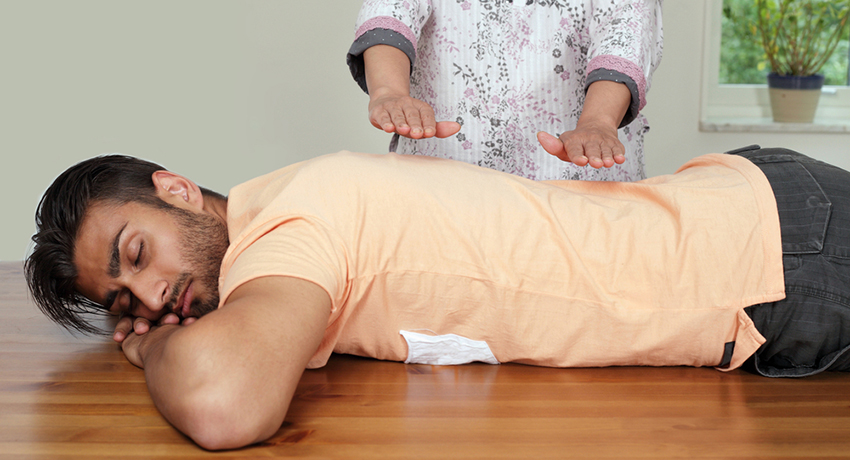What is Reiki?

Reiki session photo via shutterstock
When most people hear the word Reiki, it usually spurs one of two reactions: incomprehension, or scoffing at images of crystals and New Age candles. But Elise Brenner, a Reiki master teacher and owner of Brenner Reiki Healing in Newton, says that the therapy should be on your radar.
“Reiki is a gentle, non-invasive, spiritually-based, Japanese healing system for maintaining and restoring health and wellness of body, mind, and spirit,” Brenner explains, adding that its intention is to balance all systems of the body. The technique is both physical and mental, but the physical side is perhaps what’s best-known.
Brenner says that the physical component is administered either with a gentle touch on (or hands hovering a few inches above) the body’s major organs, glands, and joints using a series of specific hand positions. This part of Reiki can either be performed by a practitioner, or by the individual on his or her own body. The mental component is made up of a series of precepts and meditations. “It’s not a religion; there’s no dogma,” Brenner says. “The precepts are nothing more than a system of self-development, if you will.”
Brenner says Reiki can be utilized in three ways: as a tool, a practice, and a lifestyle. “When I say a tool, I really do mean alleviation of a physical condition or a physical symptom,” Brenner says, while adding that her vestibular disorder was cured through Reiki. “I also see it is as a practice, and I would say that’s kind of similar to meditation or yoga. The third, I would call Reiki a path, and people will talk about ‘being Reiki.’ Reiki itself means spiritual energy from the Japanese, so you embody your own spiritual self, your true connection to your inner self.”
Brenner, who in addition to being a Reiki Master has a Ph.D. in anthropology and works as a professor at Bridgewater State University, says that the practice really can make a huge impact on health. One leading school of thought as to why, she says, is what Harvard Medical School’s Herbert Benson calls the “Relaxation Response.” According to Benson, this is achieved through things like Reiki, yoga, and meditation, and coaxes the body into sending more blood flow to the brain and slowing muscles and organs. This effect, in turn, leads to blood pressure and heart rate regulation, better immune function, and an uptick in endorphin production.
Other theories cite electromagnetic or spiritual energy as causes for health benefits, though scientific research has not yet reached a conclusion about Reiki’s efficacy, and many are skeptical. Brenner herself admits that no one knows exactly why or how Reiki works. “I can describe its benefit, but I don’t think we’re able to explain it,” she says. “We know it works but we’re not sure of the mechanism of action.” Nonetheless, the treatment is practiced in many hospitals, including Beth Israel Deaconess Medical Center, Brigham and Women’s Hospital, and Boston Children’s Hospital.
Whether it has concrete science backing it or not, Brenner says Reiki is so non-invasive that it can only do good, not harm. “It is a natural healing practice that you can do on yourself and others. [It’s] extremely empowering,” she says. “We’re not sure of its mechanism of action, but we can point to benefits such as improved sleep, better mood, better digestion, [and] faster healing from surgery. It goes on and on and on.”


